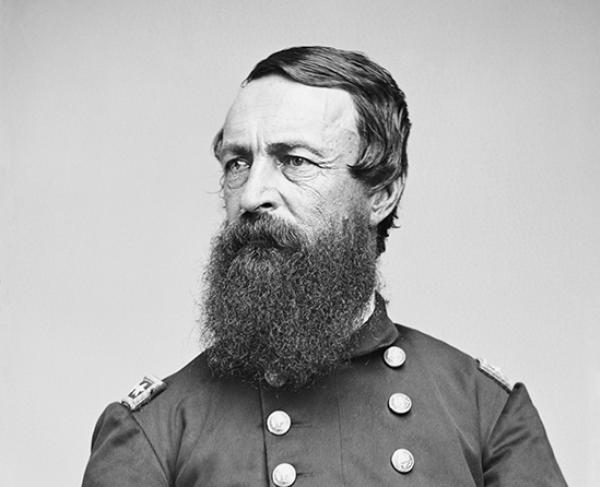David Dixon Porter

David Dixon Porter was born into a family with a strong Naval tradition. He was the son of Commodore David Porter (a naval hero of the War of 1812), half-brother of William D. “Dirty Bill” Porter, and the foster brother of David Glasgow Farragut. Born in Chester, Pennsylvania in 1813, Porter sailed to the West Indies with his father at the age of ten. At thirteen, he joined the Mexican Navy as a midshipman, entering the U.S. Navy three years later.
Porter served in the Gulf, the Mediterranean, and the South Atlantic during the Mexican War, but found the Navy in peacetime less challenging than he preferred—in one instance, in 1855, he commanded the ship Supply detailed to procure camels for the short-lived U.S. Camel Corps.
When the Civil War began in 1861, David Dixon Porter took command of the Powhatan in an abortive attempt to relieve Fort Pickens, Florida, and soon joined the Union's naval forces in the blockade of the Southern port cities.
In March of 1862, Porter, with his mortar fleet, and Union Flag Officer David Farragut, with his blue water ships, collaborated in an attack on Forts Jackson and St. Philip guarding the Mississippi River approach to New Orleans, 70 miles below the Crescent City. As Porter recognized, New Orleans was the key to the Mississippi River. Though the mortars were not as effective as Porter had hoped, Farragut's fleet fought its way past the forts, destroyed a Confederate fleet, and captured New Orleans.
Porter became the commander of the Mississippi Squadron in October 1862. Only a few months later, he assisted Union General John A. McClernand with the capture of Arkansas Post (Fort Hindman). He also helped Ulysses S. Grant to achieve the surrender of Vicksburg, Mississippi, on July 4, 1863.
Sailing was not always smooth for Porter. On the Red River Expedition in April and May 1864, Porter's gunboat squadron was stranded by unusually low water levels. Union engineers were only able to save his ships by damming the river until the waters rose enough to allow his ships to pass safely over the rapids.
After this narrowly averted fiasco, David Dixon Porter moved east to command the North Atlantic Squadron. His assault on Fort Fisher, North Carolina, in conjunction with Union General Alfred H. Terry, earned Porter his fourth Thanks of Congress.
At the close of the Civil War, Porter was promoted to Vice Admiral. He became the Superintendent of the U.S. Naval Academy and was appointed by President Grant as special advisor to the Navy Department. He was promoted to Admiral in 1870, following Farragut. David Dixon Porter died on February 13, 1891.
Related Battles
1,092
4,931
1,057
1,900

